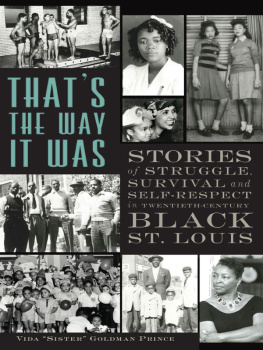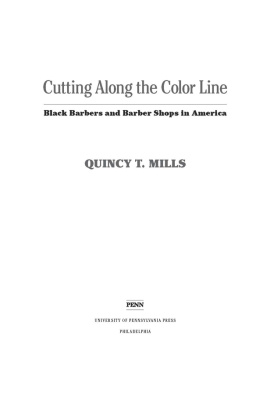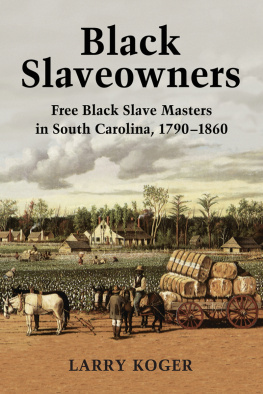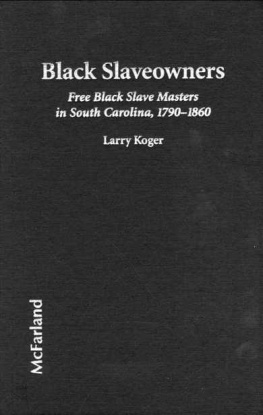Knights of the Razor
Knights of the Razor
Black Barbers in Slavery and Freedom
DOUGLAS WALTER BRISTOL, JR.

2009 The Johns Hopkins University Press
All rights reserved. Published 2009
Printed in the United States of America on acid-free paper
2 4 6 8 9 7 5 3 1
The Johns Hopkins University Press
2715 North Charles Street
Baltimore, Maryland 21218-4363
www.press.jhu.edu
Library of Congress Cataloging-in-Publication Data
Bristol, Douglas Walter, 1965
Knights of the razor : black barbers in slavery and freedom / Douglas Walter Bristol, Jr.
p. cm.
Includes bibliographical references and index.
ISBN-13: 978-0-8018-9283-7 (hbk. : alk. paper)
ISBN-10: 0-8018-9283-X (hbk. : alk. paper)
1. African American barbersHistory. 2. Free African AmericansHistory. 3. African American businesspeopleHistory. 4. African American business enterprisesHistory. 5. United StatesRace relationsHistory. I. Title.
HD8039.B32U6195 2009
646.72408996073dc22 2008052303
A catalog record for this book is available from the British Library.
Special discounts are available for bulk purchases of this book. For more information, please contact Special Sales at 410-516-6936 or specialsales@press.jhu.edu.
The Johns Hopkins University Press uses environmentally friendly book materials, including recycled text paper that is composed of at least 30 percent post-consumer waste, whenever possible. All of our book papers are acid-free, and our jackets and covers are printed on paper with recycled content.
Contents
Acknowledgments
As I reflect on the many debts I have incurred while writing this book, my mind wanders to the movie Barbershop, a comedy about one Saturday at a black-owned shop on Chicagos South Side. Calvin, who recently inherited the shop from his father, has become frustrated with the challenges and limited financial prospects of operating a small inner-city business. Early in the movie, he glances up at a large Ernie Barnesstyle mural depicting his father and says, I dont know how you did itstuck it out all these years. Calvin, having impulsively mortgaged the shop to finance several disastrous get-rich-quick schemes, faces foreclosure and sells the business to a loan shark. When he tells Eddie, the oldest barber in the shop, what he has done, his fathers old friend delivers a homily on the barbershop. After berating the younger generation for its lack of values, Eddie holds up Calvins father as a model of rectitude. Now your fatherhe had integrity, he believed in somethin. That something turns out to be concern for his fellow man: He believed that a little ol hair cut could change how a man was feelin that day. Calvin objects, noting that his father died with little money to show for his efforts. Boy, Eddie replies, he might not a had money, but he was rich with advice, encouragement. He was so rich he invested in people. You think I was the only one he ever gave a job to? The man gave every knucklehead in Chicago a job, a chance to be somebodya licensed professional barber. After hearing this speech, Calvin finally understands his father and why he enjoyed owning this barbershop. A series of madcap plot developments leads to Calvins winning back his shop and paying off his debts, so the movie has a happy ending.
When I began this book, I was like Calvin in many ways. I was frustrated with the challenges of writing a dissertation and the limited prospects of the academic job market. I was dazzled by academic fads and saw little profit in old-fashioned social history. I wondered at the fortitude of my mentors, knowing they had toiled for years to produce their books. Although there was no one person who led me to an epiphany through an impassioned speech like Eddies, many people helped me learn what really mattered. The late Marie Perinbaum instilled in me the belief that I had something important to say; she did this by spending countless hours with me in her office, demanding that I articulate my ideas forcefully. The students in my African American history courses at Coppin State College in Baltimores inner-city taught me that being a historian is about helping people draw strength and wisdom from their past. My dissertation advisor, Ira Berlin, a man rich in advice and encouragement, invested heavily in me, giving a knucklehead the chance to become a professional historian through a meticulous tutorial in how to write history and his support when I looked for a job. Finally, the black barbers who are the subject of this book inspired me as well. While I searched for barbers in hundreds of reels of microfilmed census returns, I first thought that I was looking for needles in a haystack; but over time, I realized that panning for gold would be a better metaphor, given the charm, force of personality, and sheer grit that it took for these men to succeed. Every historian should be so lucky as to find such a story.
Taking the next step, producing a finished book, required the help of many individuals and institutions. I am fond of bragging that I had the best dissertation committee at the University of Maryland. In addition to Ira Berlin, they were James Gilbert, Alfred Moss, Carla Peterson, and David Sicilia, and they labored to save me from error and to broaden my horizons. I am particularly grateful to David for introducing me to business history and getting me involved professionally in the field. While at Maryland, I received generous financial support to begin my research from the History Department and from the Committee on Africa and the Americas. I also learned much from my fellow graduate students, especially Harvey Cohen, Susan Malka, Rennie Scott-Childress, Rebecca Shurberg, and Jon Shurberg. While at Coppin State College, my colleagues Bettye Gardner, Larry Martin, Pat May, and Cynthia Neverdon-Morton took an unusual interest in a visiting professors work, sharing citations and methodological tips along with giving me the chance to present my work. The leaders in the study of black business history, Juliet E. K. Walker and Robert Weems, have served as friends and mentors for a decade, and they chaired or commented on numerous conference panels that allowed me to refine my ideas. Throughout this time, the man who led me to the study of African American history, my Masters thesis advisor, Loren Schweninger, and his wife Pat became good friends to whom I could always look for encouragement. At the Johns Hopkins University Press, Bob Brugger tirelessly championed my work and patiently waited when setbacks in the aftermath of Hurricane Katrina slowed my progress on the manuscript; then Anne Whitmore helped turn that manuscript into a book.
My past and present colleagues in the History Department at the University of Southern Mississippi have supported this project with advice, encouragement, and help. I sharpened my ideas through valuable conversations with Doug Chambers, Eric Nelson, and Pat Smith. Louis Kyriakoudes and Andy Wiest helped me navigate the process of finishing a first book. Both my former chair, Chuck Bolton, and my current chair, Phyllis Jestice, gave me course releases at critical moments, and Phyllis generously volunteered to proofread the entire manuscript. I am also indebted to Associate Provost Pat Joachim for providing me with a new laptop when I really needed one and to the interlibrary loan staff of Cox Library.
I was able to make the leap from dissertation to book manuscript during my time as a summer postdoctoral fellow at the Smithsonian Institutions National Museum of American History. I am indebted to the helpful staff there for making me aware of entirely new types of research materials and for the feedback they provided during the two times that I presented my research at the museums colloquium. In addition, I benefited from fascinating conversations with Pete Daniel and Faith Ruffin at the Smithsonian. I had similar experiences when I was a John Hope Franklin Fellow at the Special Collections Division of Perkins Library at Duke University.
Next page





